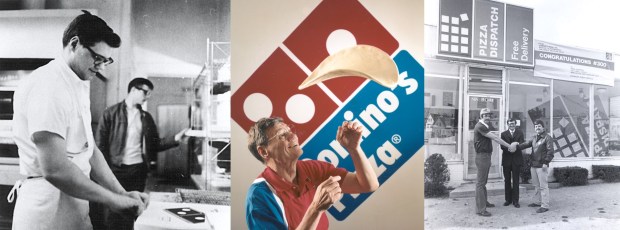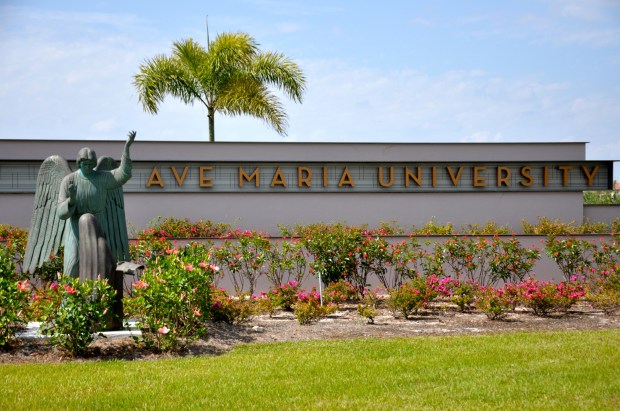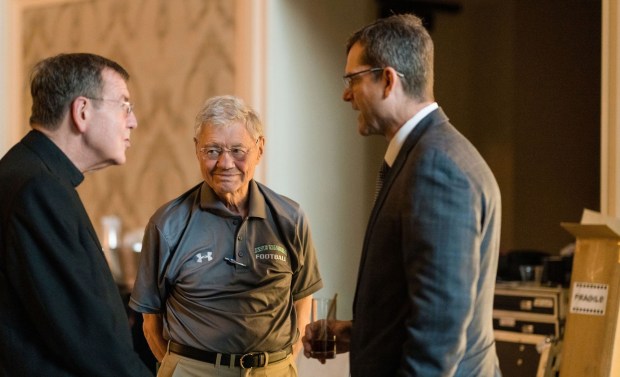Lenten Campaign 2025
This content is free of charge, as are all our articles.
Support us with a donation that is tax-deductible and enable us to continue to reach millions of readers.
A young boy named Tom spends six years in an orphanage run by nuns. Embracing Catholicism, he enters the seminary to become a priest but is ousted apparently for being a rulebreaker. He ends up instead in the military, an experience that helps give him clarity of purpose. Nearly broke, Tom starts a small, struggling business that in time, and with tireless work, grows into a billion-dollar company. He becomes wealthy beyond most people’s dreams and buys a baseball team that wins the World Series. But after reading a book by C.S. Lewis, Tom sells off his extravagant luxuries and devotes himself to good works in service of the Gospel...
The above narrative reads like the summary of a Charles Dickens novel, with a distinctly Catholic and American twist. Remarkably, however, this tale is true. It all happened to Tom Monaghan, who spoke with Aleteia recently in New York City.
The eventful life of a daydreamer
Tom Monaghan was gracious and soft-spoken when we sat down to talk. He was in town at the invitation of the Napa Institute, which honored him at their annual Faith and Business Conference for his long life’s work. At 87, Monaghan is still an active man, deeply engaged with various faith-inspired initiatives he has launched over the last 25+ years. His eyes lit up when he spoke about projects that include Ave Maria University and Ave Maria School of Law, both in Florida, and Legatus, an international organization of Catholic business leaders and executives.
Long before he conceived of those institutions, Monaghan founded the massively successful Domino’s Pizza chain. A 1986 autobiography, Pizza Tiger, explains how his business empire was built. The title referred not only to his mastery of the pizza business but to his then ownership of the Detroit Tigers baseball team. The book is a fascinating account of his humble beginnings, dramatic setbacks, and hard-won success – while also touching on his interests in architecture, sports, antique cars, and a wide range of other enthusiasms and seemingly impractical projects.
“I’m a daydreamer,” Monaghan told me with a boyish grin.
“A permanent mark”
That quality is essential to a life story that is defined by many successes, but that is also rooted in wounds that cannot be healed, at least not in this life. Chapter 2 of Pizza Tiger begins with these words:
“My father died on Christmas Eve, when I was four years old. Mother took me with her to the funeral home and held my hand as we walked up to his casket. I was frightened. It didn’t seem right for Dad to be lying there. I pulled away from her grip and jumped up on the casket. I grabbed him and hugged him tight, crying: ‘Wake up, Daddy! Wake up, Daddy!’”
The death of his father at such an early age was “a loss that left a permanent mark on my life.”
When he was six, his struggling mother put Tom and his younger brother, Jim, in a Catholic orphanage, St. Joseph Home for Boys. In many ways, young Monaghan was ill-suited for the strict rules of the home, which was run by Felician Sisters from Poland. Still, his time there made another “permanent mark” on his life, because it was there that he embraced his Catholic faith.

How Tom got his faith
Monaghan said his first and second grade teacher, Sr. Berarda, was the catalyst that drew him to the Church. “She was my mother, my father, and my teacher,” he told me. “She was a young sister, very pleasant, holy and nice. And that's really where I got my faith.”
At St. Joseph’s, Tom was immersed in Catholicism. “We had Mass every day, we had Benediction every day, long evening prayers, morning prayers, statues, and religious art all over the place.” God was the “main subject” of his schooling and life.
“I came out of there very convinced that Catholicism was true,” Monaghan adds – a conviction that was further solidified by his encounter with a priest, Father Passeno, who he met when he and Jim left the orphanage to live in Traverse City, Michigan, with their mother. “He sort of took me under his wing and gave me work around the school – 35 cents an hour. He was kind of like a father figure to me.”
“Between Sister Berarda and Father Passeno, if I weren’t a good Catholic I ought to be shot,” Monaghan said with a chuckle.
Five priorities
Convinced of the truth of the Catholic faith, Tom Monaghan wanted to be a priest. That was not to be. Tom’s independent streak had often gotten him into trouble with the nuns at the orphanage, but it got him kicked out of the seminary.
During a stint in the Marines (though he initially believed he had signed up for the Army), Monaghan had a breakthrough moment, where he conceived of what he called his “five priorities”:
“That's something I came up with while I was aboard ship in the Marine Corps in the middle of the Pacific. My five priorities are: spiritual, social, mental, physical, and financial. And as soon as I came up with that formula, the light went on. All of a sudden my self-image grew, because I knew where I was going. I knew what my priorities should be and they gave me a road map for my life.”
Pizza Tiger along with a 2016 biography, Monaghan, A Life by Aleteia contributor Joseph Pearce, lay out in detail how that road map led Monaghan to success with Domino’s and later as owner of the Detroit Tigers. His “five priorities” also brought Monaghan tremendous wealth, which he spent lavishly on homes, properties, cars, and other luxuries.

Mere humility
In 1989, however, his priorities shifted dramatically. As he recounted to Aleteia:
“I always read a lot. I probably averaged a book a week since I was eight years old. One book that really helped me was C.S. Lewis’ Mere Christianity. There was a chapter in there on pride. One of my faults I always expressed in confession was trying to impress people.
I don't know where that came from. Maybe it's from being poor, having a lot of imagination, I don't know. But the chapter on pride hit me right between the eyes. Lewis said you don't want to accomplish so much because you want more. You want more than others.”
Monaghan couldn’t sleep that night. He instead reflected on his life – back to his youth when he was an “average” athlete but would “risk my body to make a spectacular play,” just to hear others praise him. He also remembered his early business days “living in a trailer on 50 bucks a week, plowing everything back into the business. I thought that was wise, you know? Have less now, so you can have more later... but more what? More than others.” The realization stung.
“I hated showoffs and I said, ‘But I’m the ultimate showoff!’ So I took a ‘millionaire’s vow of poverty.’ I gave up all ostentatious luxuries. It was a big turnaround in my life. There was a sense of freedom. I didn’t have to have the largest yacht in the world anymore, and things like that.”
A new mission: saving souls
In time, Monaghan divested himself of the Detroit Tigers and later Domino’s. When I commented that that sounded like a very dramatic decision, Monaghan disagreed. “It didn’t seem that (dramatic) to me. I was lucky to have a lot of wealth. Very few people had more in those days.”
Monaghan had vowed to give most of his fortune away, but to whom? One idea he rejected was giving his wealth to medical research. “Some people might live for 10, 15, 20 years longer, but they’re still going to die, and if they go to Hell I haven’t accomplished anything.”
He thought back to his teenage years. “When I joined the seminary at 14 years old, on the form they asked: Why do you want to be a priest? And my exact answer was: I seek the salvation of souls.”
Monaghan’s desire had not altered over the ensuing decades. Based on his personal experience, he became convinced that the best way to “save as many souls as possible” was to focus his efforts on Catholic education, specifically Catholic higher education.

Two Ave Marias
As a successful businessman, he had served on the boards of Catholic colleges and had generally found the experience frustrating. Fundraising was always tight and enrollments trended downward. A colleague showed him “a study that was done that showed that Catholics fared worse in their faith and morality and practice of their faith when they went to Catholic colleges than to non-Catholic ones. It blew my mind.”
“I thought (those) schools had lost their way doing what they felt they had to do to survive — basically caving into the culture. I thought that if I could open up a school that was faithful to the teaching of the Church, blatantly Catholic, and that thrived, other colleges would follow and say, ‘If Ave Maria can do it, why can’t we do it?’”
Creating a “beacon for Catholic higher education” would be a huge challenge, however. “There hadn’t been a new Catholic university founded in 39 years,” Monaghan pointed out. “It’s not easy to do and it costs a lot of money. I didn’t have enough, but I had enough to give it a good start. And I thought I had an idea for a type of school that people would respond to.”
There have been many ups and downs, but Monaghan is proud of Ave Maria University and Ave Maria School of Law and said they are both “thriving.” He wants the schools to continue focusing “on getting better and better and better” rather than on expansion. “By staying smaller, you can be better,” Monaghan insists. His model is Hillsdale College in Michigan. “It’s not a big school, but it has a big impact.”
Ambassadors of Christ
Legatus is yet another way that Tom Monaghan seeks to “save souls.” An international organization for Catholic business owners and executives, the inspiration for Legatus came to Monaghan after a meeting with Pope John Paul II. Latin for “ambassador,” Legatus has a very specific mission.
“I wanted to gather the most proven leaders in the Church — and I think that’s businessmen and women. There might be people who have higher IQs in academia, or are more articulate like lawyers and so on, but people who get things done are businesspeople. And they get things done through others, so it’s a multiplication thing.
I thought we ought to get those people together – all practicing Catholics – and the only purpose is to help them be better Catholics. No projects. The only projects are the members themselves.”
Members meet every month for Rosary, Confession, and Mass, a shared meal with speakers – and also cocktails. “I tried to take out the cocktail session – didn’t think we had time – but no one agreed with me on that,” he said with a laugh. There is also a yearly convention and pilgrimages to Catholic shrines all over the world.
As a consequence of these friendships, members then go off and build up the Kingdom of God in their own original ways, much as Tom Monaghan was inspired to do by his encounters with figures like Sister Berarda and the writings of C.S. Lewis. “Members just inspire each other. That was the purpose.”

Eternally optimistic
As we ended our meeting, Tom Monaghan expressed the hope that he still has “plenty of healthy years ahead.” He seems quite fit and has long been an exercise enthusiast, but ever since that Christmas Eve in 1942, he has known how terribly fragile life can be. Early in our meeting, I asked Monaghan how he stays hopeful in front of adversity. “I’ve always wondered that myself,” he replied. “I think I have a good Guardian Angel because I’ve always been optimistic and never stayed down long.”
“I’ve always been a dreamer,” Monahan repeated with a smile.
Readers who wish to learn more about Tom Monaghan’s life are encouraged to pick up a copy of Pizza Tiger, along with Monaghan: A Life, an authorized biography by Joseph Pearce. Both books are refreshingly candid about Monaghan’s failings and failures and how he continues to grow as a person and business leader.










